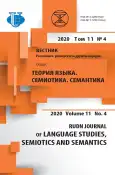Средства имплицитности в жанре русскоязычных политических блогов
- Авторы: Видинеева Н.Ю.1
-
Учреждения:
- Пензенский государственный университет
- Выпуск: Том 11, № 4 (2020)
- Страницы: 733-744
- Раздел: Функциональная грамматика. Функциональная семантика
- URL: https://journal-vniispk.ru/2313-2299/article/view/323309
- DOI: https://doi.org/10.22363/2313-2299-2020-11-4-733-744
- ID: 323309
Цитировать
Полный текст
Аннотация
Исследование посвящено описанию жанровых особенностей блога, а также анализу языковых средств, актуализирующих имплицитные смыслы в политических блогах. Непрерывное развитие средств коммуникации ставит перед исследователями задачи изучения особенностей новых медиа. С точки зрения лингвистики одним из наиболее обоснованных подходов к такого рода исследованиям является жанровый подход. Мы полагаем, что прагматическое жанроведение наиболее полно удовлетворяет потребности изучения блогов, т.к. направлено на диалогичность жанра и позволяет учитывать фактор адресанта и адресата. Блог является гибридным жанром, произошедшим из жанра личных дневников. Мы считаем, что блоги могут считаться гипержанром, объединяющим в себе жанр блоговой заметки и жанр комментария. В статье приводятся основные характеристики блога как жанра компьютерно-опосредованной коммуникации. Теория языковых средств имплицитности активно разрабатывается многими учеными. Нашей целью стало исследование средств имплицитности, к которым прибегают авторы русскоязычных политических блогов. Актуальность изучения проблемы имплицитности и имплицитных смыслов заключается в отсутствии согласованного мнения относительно природы имплицитности. Кроме того, нам представляется актуальной разработка типов языковых средств, реализующих имплицитные смыслы. Описание особенностей языковых средств имплицитности, характерных для интернет-жанров, в частности, жанра блога, также является актуальной исследовательской задачей. Исследование проводилось качественными общенаучными и лингвистическими методами. Результаты показали, что русскоязычные блогеры склонны использовать стилистически сниженную лексику, фразеологические выражения и аллюзии для выражения негативной имплицитной оценки политическим деятелям и событиям.
Ключевые слова
Об авторах
Наталья Юрьевна Видинеева
Пензенский государственный университет
Автор, ответственный за переписку.
Email: ya.natashavidineeva@yandex.ru
преподаватель кафедры «Английский язык» Историко-филологического факультета
ул. Красная, 40, Пенза, Российская Федерация, 440026Список литературы
- Shipitsina, L.Y. (2012). Hybridity as a characteristic property of computer-mediated communication. Cherepovets State University Bulletin, 3—1 (40), 91—95. (In Russ.)
- Dementiev, V.V. (2010). Theory of speech genres. Moscow: Znak. (In Russ.)
- Vidineeva, N.Yu. (2019). Principles of speech implicitness distinguishing (based on British media discourse) In Modern trends in linguistics and language teaching: the problem of the method. Materials of the III International scientific and practical conference. Vol. 1. Penza. pp. 35—39. (In Russ.)
- Vidineeva, N.Yu. (2019). Implicit linguistic means in the genre of blogs on brexit. Political Linguistics, 5, 64—75. doi: 10.26170/pl19-05-06. (In Russ.).
- Yule, G. (1996). Pragmatics. Oxford: Oxford Univ. Pr.
- Bauman, M.L. (1999). The Evolution of Internet Genres. Computers and Composition, 16, 269—282. doi: 10.1016/S8755-4615(99)00007-9.
- Bakhtin, M.M. (1997). The problem of speech genres In Bakhtin M.M. Collected works. Vol. 5. Moscow: Russian Dictionaries. pp. 159—206. (In Russ.)
- Goroshko, E.I. & Polyakova, T.L. (2015). The construction of a typology of social media genres. Speech Genres, 2, 119—127. (In Russ.).
- Kirillov, A.G. (2017). Transformation of the blog genre in the programs for instant messaging. Speech Genres, 2, 260—267. doi: 10.18500/2311-0740-2017-2-16-260-267. (In Russ.).
- Herring, S.C., Scheidt, L.A., Wright, E. & Bonus, S. (2005). Weblogs as a bridging genre. Information Technology and People, 18(2), 142—171. doi: 10.1108/09593840510601513. [Electronic resource] URL: https://www.researchgate.net/publication/220436990_Weblogs_ as_a_bridging_genre (accessed: 05.08.2019).
- Kirillov, A.G. (2014). Discourse in the blogosphere: the key concepts and categories of blogs as hypergene of computer-mediated communication In Genres and types of text in scientific and media discourse: Interuniversity collection of scientific papers. Vol. 12. Orel. p. 260—270. (In Russ.).
- Bazhenova, E.A. & Ivanova, I.A. (2012). Blog as an Internet genre. Bulletin of Perm University. Series: Russian and foreign philology, 4, 125—131. (In Russ.).
- Kolokoltseva, T.N. (2016). The dialogue in the genres of Internet communication (chat, forum, blog). Speech Genres, 2, 97—105. doi: 10.18500/2311-0740-2016-2-14-96-104. (In Russ.).
- Melikyan, S.V. (2013). Current trends in interaction with the audience on the Internet. Scientific Bulletin of Voronezh state University of architecture and civil engineering. Series: social and humanitarian sciences, 2, 130—136. (In Russ.).
- Ermakova, E.V. (2009). Multiple aspects of implicitness: implicitness in language and speech. Proceedings of Saratov University. Series: Sociology. Political science, 1, 58—61. (In Russ.).
- Arzhanova, I.A. & Abrashkina, M.V. (2018). Distinctive features and criteria for identifying colloquial and stylistically reduced vocabulary In Foreign languages in the dialogue of cultures. Materials of the all-Russian scientific and practical conference (with international participation). Saransk. pp. 122—126. (In Russ.).
- Melikyan, A.V. (2015). Functioning of stylistically reduced vocabulary in the modern political discourse of the United States In Language and law: actual problems of interaction. Materials of the V International scientific and practical conference. Rostov-on-Don. pp. 171—177. (In Russ.).
- Kulikova, O.F. (2019). Stylistically reduced vocabulary in the language of the newspaper (based on the material of the “Pacific star”). Amur scientific bulletin, 2, 23—27. (In Russ.).
- Malyarchuk-Proshina, U.O. & Krapaleva, U.E. (2018). Stylistically reduced vocabulary in print media texts. Trends in the development of science and education, 43, 39—43. (In Russ.).
- Leskina, S.V. (2012). Actualization of the principle of the reliability of negation in Russian and English phraseological units in the process of interaction between the categories of pejorative and emotive. Bulletin of the Leningrad state University named after A. S. Pushkin, 1, 171—181. (In Russ.).
- Arsenault, M. (2014). An Implicature Account of Idioms. International Review of Pragmatics, 6.1, 59—77. doi: 10.1163/18773109-00601004.
- Cuddon, J. (2013). Dictionary of Literacy Terms and Literacy Theory. Oxford: Wiley-Blackwell.
Дополнительные файлы









